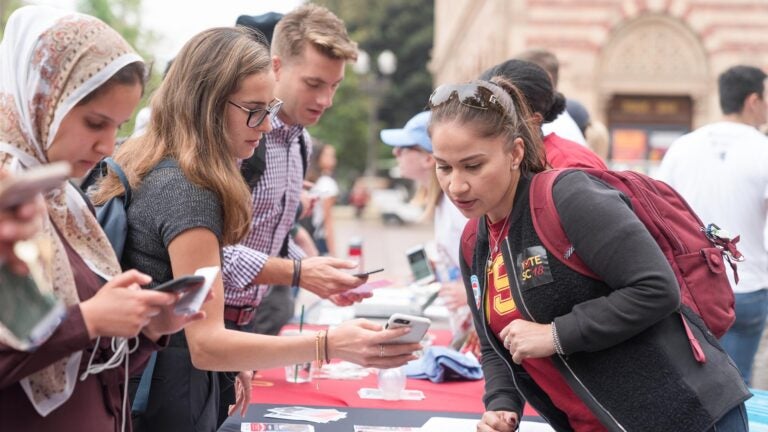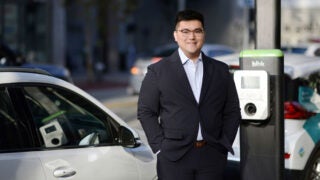
Nearly 500 USC students registered to vote as a part of National Voter Registration Day drive Sept. 25. (Photo/Ling Luo, Daily Trojan)
Youngest voters more discouraged by today’s political climate than other voters, poll finds
The big questions: How will that disappointment affect how they vote Nov. 6 — and will they bother to vote at all?
What effect will the contentious political environment have on the millennial vote?
In a USC Dornsife/Los Angeles Times poll of 5,044 adults conducted this summer, voters under the age of 35 were the least likely to feel positive emotions such as satisfied, hopeful or pleased about news emanating from Washington, D.C. They were also the most likely to report negative feelings.
In a news environment that includes President Donald Trump accusing media outlets of making up stories, countered by fact-checkers charging that the president and his administration are making false or misleading statements, many young millennial voters in the poll reported that they frequently feel outraged and confused about what is really going on. The midterm elections are Nov. 6.
Negative feelings among all voters, including millennial voters
“Young millennial voters are not alone in experiencing negative feelings about the news; very few voters of any age in our poll reported feeing positive emotions,” said Jill Darling, survey director at the Center for Economic and Social Research at the USC Dornsife College of Letters, Arts and Sciences, which conducted the poll in partnership with USC Dornsife’s new Center for the Political Future.
Most young millennials said the news is either having no effect or making them feel less motivated to vote.
Jill Darling
“However, unlike older voters who reported that these feelings are translating into an increased motivation to go to the polls in November, most young millennials said the news is either having no effect or making them feel less motivated to vote,” she said.
It is well documented that frequency of voting tends to increase with age as people build ties to their communities through marriage and homeownership. In an election year that is often viewed as a referendum on the Trump presidency, there has been some speculation that millennial voters may turn out in higher numbers. However, when all eligible voters in the poll were asked how likely they were to vote in November, the average was barely more than half among young millennial adults. That stands in stark contrast to the high of 85 percent among their baby boomer grandparents who said they were likely to vote.
Millennial voters: Why they might sit out the election
“There may be many reasons why people who usually sit out the midterms could decide to vote this year,” Darling said. “Our study indicates that negative feelings caused by consuming news created by, or about, President Trump may be one of those motivators for older voters on the left and on the right. However, those feelings seem to be having either no effect, or a suppressive one, on young millennial adults.”
The USC Dornsife/L.A. Times poll is a partnership of the Los Angeles Times and two USC Dornsife institutions: the Center for the Political Future and the Center for Economic and Social Research. The overall margin of sampling error is plus or minus 3 percentage points for all eligible and plus or minus 4 for registered and likely voters. The survey, results and methodology are available online. Information about the Center for Economic and Social Research Understanding America Study internet panel is available online.



